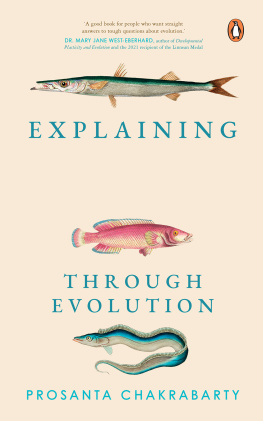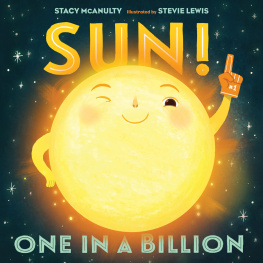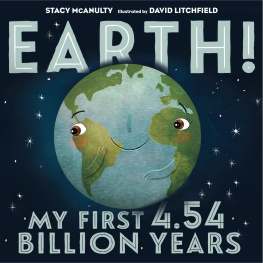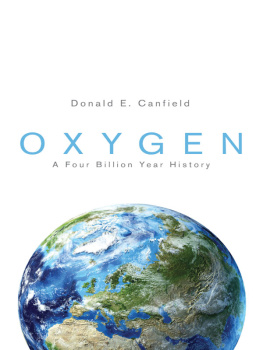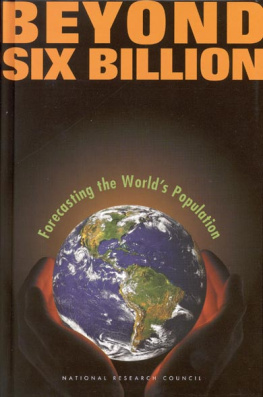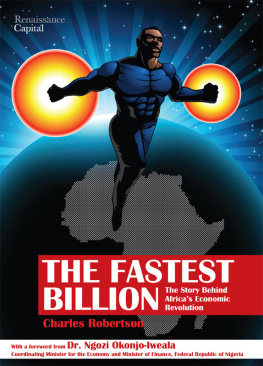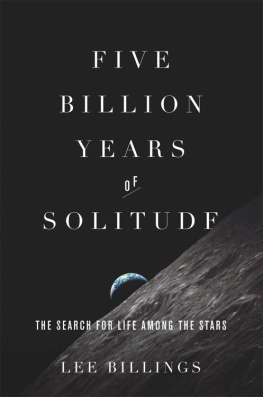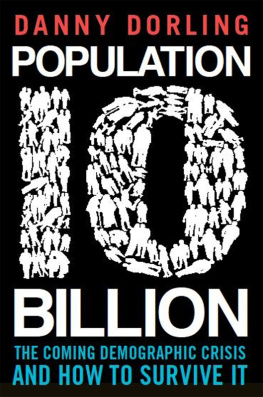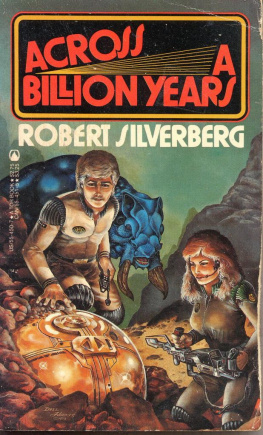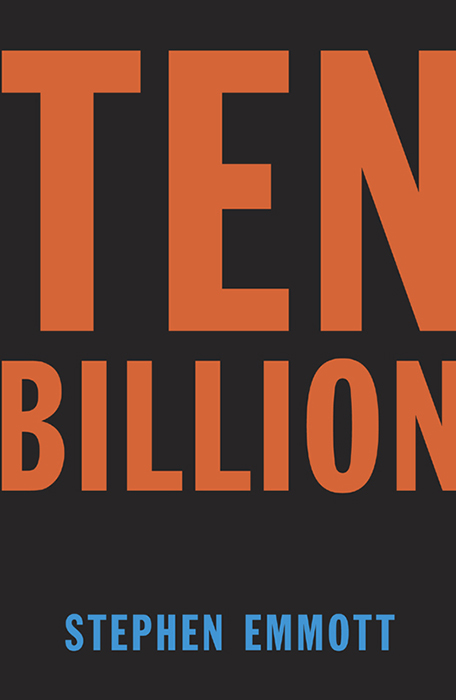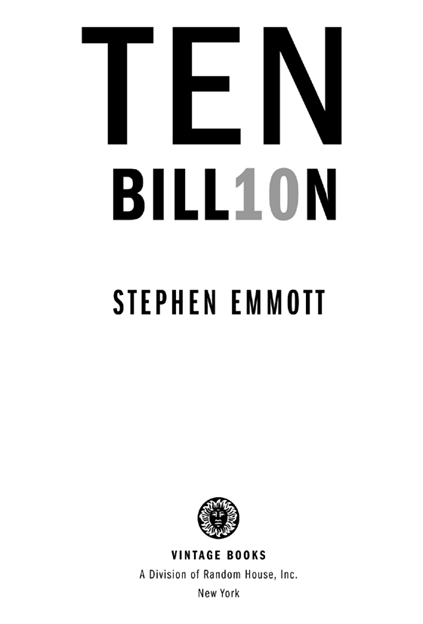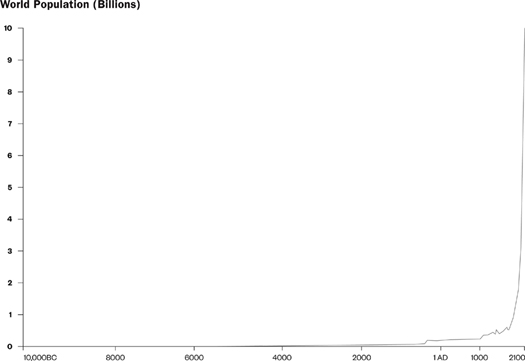STEPHEN EMMOTT
TEN BILLN
Stephen Emmott is head of Computational Science at Microsoft Research. He leads a broad scientific research program, at the center of which is an interdisciplinary team of new kinds of scientists, and a new kind of laboratory, in Cambridge, England, pioneering new approaches to tackle fundamental problems in science. His labs research spans from molecular biology, immunology, and neuroscience, to plant biology, climatology, biogeochemistry, terrestrial and marine ecology, and conversation biology, as well as the new fields of programming life and artificial photosynthesis. Stephen is also Visiting Professor of Computational Science, University of Oxford; Visiting Professor of Biological Computation, University College London; and Distinguished Fellow of the UK National Endowment of Science, Technology and the Arts.
A VINTAGE BOOKS ORIGINAL, AUGUST 2013
Copyright 2013 by Stephen Emmott
All rights reserved. Published in the United States by Vintage Books, Random House LLC, New York, a Penguin Random House Company.
Vintage and colophon are registered trademarks of Random House LLC.
The Cataloging-in-Publication Data is on file at the Library of Congress.
eBook ISBN: 978-0-345-80646-8
Vintage ISBN: 978-0-345-80647-5
Cover design by Matt Dorfman
www.vintagebooks.com
v3.1
Contents
This is a book about us.
Its a book about you, your children, your parents, your friends. Its about every one of us. Its about our failure: failure as individuals, the failure of business, and the failure of our politicians.
Its about the unprecedented planetary emergency weve created.
Its about the future of us.
Earth is home to millions of species.
Just one dominates it. Us.
Apartment buildings in Shanghai
Our cleverness, our inventiveness, and our activities have modified almost every part of our planet. In fact, we are having a profound impact on it.
Indeed, our cleverness, our inventiveness, and our activities are now the drivers of every global problem we face.
And every one of these problems is accelerating as we continue to grow toward a population of ten billion.
In fact, I believe we can rightly call the situation were in right now an emergencyan unprecedented planetary emergency.
This is the reason I have written this book.
I am a scientist.
I lead a lab, in Cambridge, England, which is home to a unique collection of amazing young scientists. We conduct research into complex systems, including the climate system and ecosystems, as well as the impact of us humans on the earth.
Science is ultimately about understanding. And this is what we try to do: to understand the earths climate, and the behavior of the earths terrestrial and marine ecosystemsfrom its microbial communities to its forestsand to predict how these vital planetary systems will respond to change.
Change caused by us.
We humans emerged as a species about 200,000 years ago. In geological time, that is really incredibly recent.
Just over 10,000 years ago, there were one million of us.
By 1800, just over two hundred years ago, there were one billion of us.
By 1960, fifty years ago, there were three billion of us.
There are now over seven billion of us.
By 2050, your children, or your childrens children, will be living on a planet with at least nine billion other people.
Sometime toward the end of this century, there will be at least ten billion of us. Possibly more.
How did we get to where we are now?
Human Population from 10,000 B.C., projected to 2100. Data from 1950 from United Nations Department of Economic and Social Affairs, Population Division: World Population Prospects, 2011.
We got to where we are now through a number of civilization- and society-shaping events; most notably, the agricultural revolution, the scientific revolution, andin the Westthe public-health revolution.
These events have fundamentally shaped how we live, and have fundamentally shaped our planet. Their legacy will continue to shape our future. So we need to look at our growth and activities through the lens of these developments.
By 1800 the global population had reached one billion.
One of the principal reasons for this growth was the invention of agriculture. The agricultural revolution enabled us to go from being hunter-gatherers to highly organized producers of food, and allowed our population to grow.
A useful way to think of the development and importance of agriculture is in terms of at least three agricultural revolutions. The first took place over 10,000 years ago. This was the domestication of animals and the cultivation of plant types.
The second agricultural revolution was between the fifteenth and nineteenth centuries. This was a revolution in agricultural productivity and the mechanization of food production.
The third happened between the 1950s and 2000s; the so-called green revolution.
But theres another story here: the start of a fundamental transformationof land useby humans.
One hundred and thirty years later, we had grown to two billion.
It was 1930. The impact of another revolutionthe industrial revolutionwas being felt. The world was being transformed by manufacturing, technological innovation, new industrial processes, and transportation.
The continuing expansion of agriculture and the revolution in public health enabled us to continue to growrapidly.
But theres another story here too: the start of our lethal addiction to coal, oil, and gas as our principal sources of energy.
Thirty years later, we had grown to three billion.
It was 1960, and we were in the middle of a food revolution. There were more of us. Far more of us. We needed more food. Far more food. More than the established agricultural system could provide.
What became known as the green revolution provided this extra food.
It did so through:
The industrial-scale use of chemical pesticides, chemical herbicides, and chemical fertilizers;
an unprecedented expansion of land use;
and the wholesale industrialization of the entire food production system. This included the industrialization of raising and harvesting animals for food, from the rise of industrial-scale factory fishing fleets to battery farming of pigs, poultry, and beef.
This revolution came at a huge cost to the environment, in terms of:
loss of habitat;
pollution;
overfishing.
It also set in motion an unprecedented decline of species and the start of the degradation of entire ecosystems.
By 1980, twenty years later, there were four billion of us on the planet.
The green revolution had produced much more food. That made food cheaper.
In turn, that meant we had more money to spend. And we had started to spend it on stuff: televisions, video recorders, Walkmans, hair dryers, cars, and clothes. And we also started to spend it on vacations. Far more vacations.


